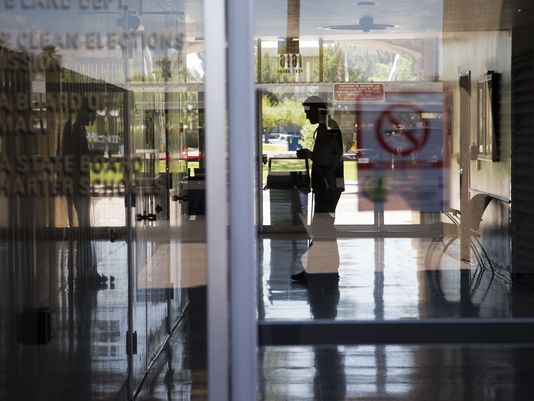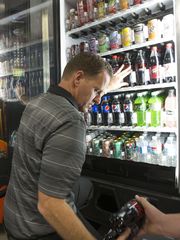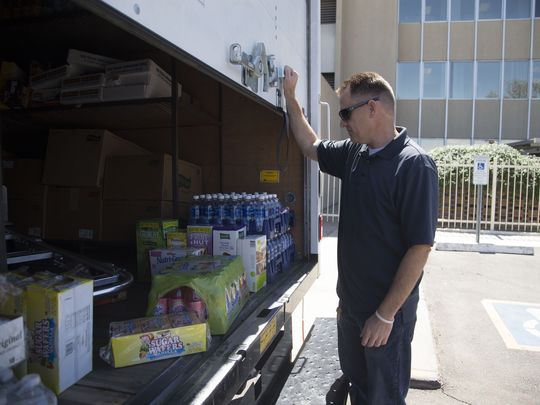Phoenix ends vending-machine fight over blind entrepreneurs
State agency, blind entrepreneurs have been asking city to open up business opportunities.
 Adam Bevell, a blind entrepreneur, restocks vending machines at State Land Department Building in downtown Phoenix.(Photo: Nick Oza / The Republic)
Adam Bevell, a blind entrepreneur, restocks vending machines at State Land Department Building in downtown Phoenix.(Photo: Nick Oza / The Republic)
Blind people in Arizona are supposed to get first dibs on opportunities to operate vending machines in government buildings, but Phoenix had been in a long-running dispute with the state on following that law.
This spring, though, the tussle is ending after the city inked an agreement with a state agency that advocates for entrepreneurs who are blind.
In January, the city and Arizona Department of Economic Security signed a contract to let people who are blind manage drink and snack machines at dozens of facilities throughout Phoenix, from libraries to recreation centers. Those operators will take over those vending sites in the coming months.
For Adam Bevell and other blind vending-machine operators, the deal has been years in the making and offers a chance to improve their financial independence. On Friday, Bevell stocked machines at his first new city facility.
"It's been quite a struggle," Bevell said of the push to get into city facilities. "‘I’m ecstatic. We’ve been looking forward to this for quite a while and kind of holding our breath."
City faced legal pressure
When The Arizona Republic first reported on the standoff a year ago, a DES official said the city had been evasive and uncooperative about making an agreement. But public attention and legal persuasion from the state helped change the tone, state officials said.
Timothy Jeffries, director of the Arizona Department of Economic Security, hailed the agreement as a victory for people who are blind.
“I’m always glad when people recognize the wisdom to be found in laws," Jeffries said of the city. “In my opinion, it shouldn’t take a law to inspire us to be innovative, to productively engage (blind people)."
Jeffries is referring to a state law that was at the center of the conflict between Phoenix and blind advocates and entrepreneurs. Known as the "mini" Randolph-Sheppard Act, it gives operators who are blind priority to manage vending machines and cafeterias on state, county and city property.
The law is the state's version of the federal Randolph-Sheppard Act, which Congress adopted in 1936 to create jobs for people who were both blind and unemployed during the Great Depression.
Phoenix's move affects a handful of operators, but the opportunity could be life-changing as many blind people struggle to find work. Unemployment among people who are visually disabled is more than 70 percent, according to the National Federation of the Blind.
Program gave 'feeling of self-worth'
 Blind businessman Adam Bevell, left, and his brother-in-law Chris Wennerholm stock a vending machine they own inside the Arizona Capitol Center in Phoenix. (Photo: Pat Shannahan/ The Republic)
Blind businessman Adam Bevell, left, and his brother-in-law Chris Wennerholm stock a vending machine they own inside the Arizona Capitol Center in Phoenix. (Photo: Pat Shannahan/ The Republic)
Bevell, 40, said access to city facilities will allow him to get closer to his goal of growing a business large enough to support himself, his wife and their four children.
He began his career as an elementary-school teacher, but felt forced to quit his job in his late 20s when he lost most of his sight due to a condition called retinitis pigmentosa, a genetic degenerative eye disease. He started losing his vision as a teenager, but the condition accelerated in his 20s.
Losing his eyesight so far into adulthood was devastating, Bevell said. He struggled with feelings of worthlessness and depression as he tried to figure out what to do next. His wife took on two jobs just to support the family.
Then, Bevell said he found a new sense of "self-worth, independence" when he enrolled in the state's Business Enterprise Program several years ago. The program trains people who are visually impaired to run their own businesses operating vending machines, cafeterias, coffee shops and snack bars in public facilities.
“It's empowering to feel like you're making a difference, contributing to society. For me, it's very gratifying.”
Some such operators primarily work behind the scenes and hire employees to restock vending machines for them, but Bevell plays a role in every part of his business. On a typical day, Bevell and his brother-in-law, who drives, make numerous stops to restock vending machines at government buildings throughout central Phoenix.
But Bevell's dream of building a larger business has been on hold. He said he's been waiting almost three years for the city to let him expand.
On Friday, the wait ended when Bevell stocked his first new vending machines at a city water facility. His route already included one city building, but Phoenix's agreement with DES will allow him to add many more. He said he also expects to hire another employee.
When Bevell learned about the deal with the city, he said he was so excited that he waited until he got home to tell his wife. She teared up when she heard.
"I couldn't tell her over the phone," Bevell said. "Being able to break that news to her. I can’t even put it into words. It’s overwhelming, honestly. We see it as a blessing."
Long spat over program
 Phoenix and the Arizona Department of Economic Security signed a contract to let people who are blind manage drink and snack machines at dozens of facilities throughout Phoenix. Adam Bevell, a blind entrepreneur, said, "It's empowering to feel like you're making a difference, contributing to society. (Photo: Nick Oza / The Republic)
Phoenix and the Arizona Department of Economic Security signed a contract to let people who are blind manage drink and snack machines at dozens of facilities throughout Phoenix. Adam Bevell, a blind entrepreneur, said, "It's empowering to feel like you're making a difference, contributing to society. (Photo: Nick Oza / The Republic)
The agreement allowing blind entrepreneurs to operate more vending locations didn't happen easily. DES officials said the issue was resolved after the Arizona Attorney General's Office got involved and reiterated that state law gives such operators priority to run vending sites on city property.
Yvette Roeder, a city spokeswoman, said the city will lose revenue as a result of its agreement to let operators who are blind take over vending-machine locations, but she said the city does not have an estimate for how much it might lose.
When asked about criticism from DES officials, Roeder responded briefly, saying Phoenix is working to "transition the vending locations as quickly as possible."
In 2014, Phoenix attempted to find a company to operate vending machines without offering the opportunity to blind entrepreneurs first. The city sought bids from vending companies, and bids were to be evaluated based on how much revenue they could generate, among other criteria.
State law prohibits the city from collecting money from vending-machine entrepreneurs who are blind. Phoenix's request for bids prompted objections from the state, and Bevell and other entrepreneurs said the city appeared to be chasing dollars at their expense.
The city received no qualifying submissions and pulled the request for bids. City officials began negotiating with DES, but those talks became tense after the city included a lengthy list of requirement for vending-machine operators. DES said the final agreement is mutually beneficial.
There are a handful of blind businesspeople who operate vending machines in Phoenix buildings, but many of the machines have been run by other companies that pay the city to use its space. Now, they will take over more of those locations.
Jason Sauer, who manages the state program, said the new agreement could signal the first step of an improved partnership after repairing years "of a lack of communication." He said the city and DES are "halfway there" in resolving the issue.
Sauer said the relationship stands to bring more opportunities. The state is now negotiating with Phoenix for blind people to operate other vending-machine sites. DES and the city also recently made an agreement to operate a coffee kiosk in the lobby of City Hall, which currently houses a Starbucks.
“I think their understanding of what the law is or is not, and I think also understanding what the blind vendors’ capabilities and abilities are, (has) evolved quite a bit," Sauer said.

